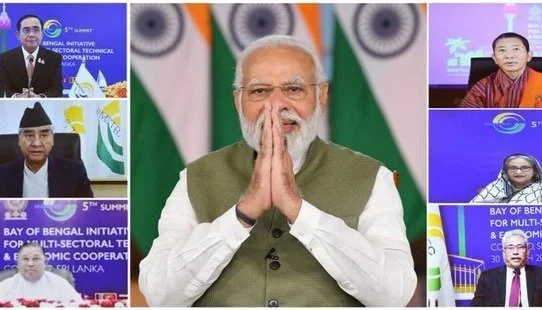9DASHLINE recently enjoyed the opportunity to speak with H.E. Sujiro Seam, the European Union’s Ambassador to ASEAN. This discussion dives into the key aspects of this relationship, exploring areas of cooperation, shared challenges, and the future direction of EU-ASEAN ties.
Read MoreWritten by Tobias Scholz
The recent enhancement of security dialogues and mechanisms will continue to look inward by building trust, resilience, and capacity among BIMSTEC partners.
Read MoreWritten by Dr Phyu Phyu Oo
Gender-responsive security sector reform shows promise in recognising the security threats to women and marginalised individuals, and working towards ending such violence in the Indo-Pacific region.
Read MoreWritten by Hunter Marston
Some experts suggest Indonesia is likely to propose adopting a seven-vote threshold instead of requiring all ten members to agree on passing a measure. This would go a long way to making the institution more agile, responsive, and decisive.
Read MoreWritten by Susannah Patton
The mixed picture for the death penalty in Southeast Asia, especially in countries where the death penalty is being actively debated, such as Malaysia, suggests that further advocacy by Australia and other like-minded countries would be timely.
Read MoreWritten by Giulia Sciorati
As the SCO opens to other Asian sub-regions and even the African continent, Central Asia risks losing its centrality and becoming a minor geographical area compared to the Gulf or Southeast Asia, where the national interests of SCO member states (and China, above all) are prominent.
Read MoreWritten by Joy Joy
Most importantly, ASEAN and the international community must recognise that the future of Myanmar belongs to its people. They must listen to the voices of the Burmese people and their democratically-elected representatives while making meaningful engagements to help resolve the crisis.
Read MoreWritten by Susannah Patton
The President’s positive statement at least opens the door for US allies and partners to put forward their views on US regional economic engagement. The United States’ offer to host APEC in 2023 should give high-level impetus for the development of this economic framework.
Read MoreWritten by Sreeradha Datta
Consolidated subnational efforts can enable safer ground conditions that would end the discrimination and persecution faced by the Rohingyas and would allow them a future that is not tainted by violence and hostility and the possibility to live with dignity and safety.
Read MoreIn the past year or so there has been a big change in the way China’s political system is perceived in Europe. China’s actions with regard to several smaller European states like Sweden, Czech Republic, Lithuania, for example, have alerted publics to the political risks of close relations with Beijing.
Read MoreWritten by Jeremy Garlick
Beijing will look to ensure first and foremost that Uygur separatists do not gain support from the Taliban. In return, they will dangle some promises of investment for the sake of generating goodwill.
Read MoreWritten by Man Mohini Kaul
While India’s Act East Policy may sometimes appear to fall short in the implementation of specific projects, there is a resurgence marked by the convergence of strategic and security interests and a mutual desire for greater economic engagement.
In Brief with Michael Reiterer
EU policy on North Korea must balance the commitment to strictly uphold the international rules-based system with the need to adopt flexible diplomacy that will convince Kim Jong-un to move in a positive direction.
Read MoreWritten by Rudabeh Shahid and Arafat Kabir
If China responds to Bangladesh’s urgent call for help, it will only reinforce the established trend. For now, Dhaka has learned to keep faith in Beijing, which is most evident in Bangladesh’s reluctance in joining the Quad Security Initiative.
Read MoreWritten by Murray Heibert
Beijing is unlikely to step up its role in Myanmar unless there is a sudden and massive outpouring of refugees across the border into China or opponents of the junta begin threatening Chinese infrastructure in the country.
Read MoreWritten by Andrea Malji
The trade relationship between Myanmar and Sri Lanka has flourished. In addition, both countries have signed several agreements and MOU’s over the past decade, signalling important growth between the two countries. It is unclear how the recent coup in Myanmar will impact bilateral relations though some analysts worry Sri Lanka is following a similar path.
Read MoreWritten by Sam Baron
While some argue that universal jurisdiction is a flawed method of accountability, it remains an indisputably concrete tool to apply pressure on the Kim regime and bring further attention to the heinous crimes committed against the North Korean people.
Read MoreWith Hunter Marston
For the foreseeable future, small powers in Southeast Asia will cling to their independent foreign policies and seek to diversify their foreign relations in an attempt to find a balance that allows them more options and to avoid choosing sides in the brewing superpower rivalry.
Read More
















